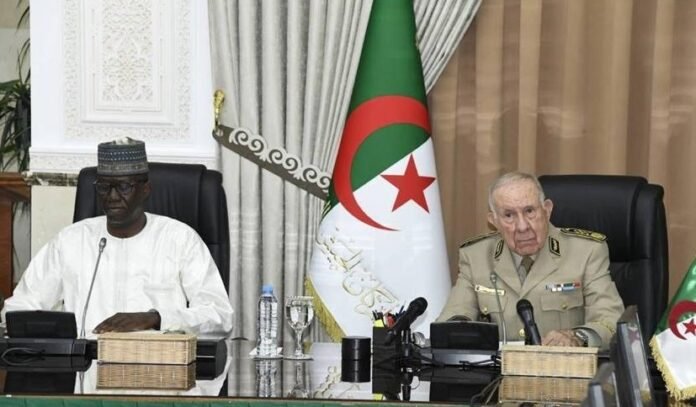In recent days, Algeria has significantly intensified its efforts to rekindle relations with Niger. This diplomatic push is marked by high-level visits, including one by Niger’s Prime Minister Mohamed Lemine Zein and Defense Minister Salifou Modyla, shortly after Algerian Energy Minister Mohamed Arkab’s trip to Niger aimed at revitalizing a crucial gas pipeline project.
The Diplomatic Revamp
The recent visit of the Nigerien delegation to Algeria signifies a strategic move to mend ties between the two countries. According to Algerian state media, the delegation’s agenda included meetings with Algerian Prime Minister Aymen Benabderrahmane and Chief of Staff General Saïd Chengriha, focusing on enhancing bilateral cooperation in various sectors, including security and military.
This rapprochement follows a period of strained relations triggered by Algeria’s rejection of the coup that ousted former Nigerien President Mohamed Bazoum. The new regime in Niamey had also declined Algeria’s mediation efforts post-coup. However, recent international reports suggest a strategic shift by Algeria, driven by escalating regional tensions.
Regional Dynamics and Economic Interests
Algeria’s renewed interest in strengthening ties with Niger is closely tied to the broader geopolitical landscape. The resurgence of conflict in Libya, deteriorating relations with neighboring countries like Mali and Burkina Faso, and strained diplomatic ties with France—partially due to France’s support for Morocco’s stance on Western Sahara—have heightened Algeria’s need for stable regional partnerships.
Economic factors play a critical role in this diplomatic realignment. Central to this is the proposed gas pipeline project stretching from Nigeria through Niger to Algeria. This project competes with a similar Moroccan initiative—the West African Gas Pipeline—stretching from Nigeria to Morocco through eleven other countries. Algeria fears that Morocco’s project might overshadow its own, especially since the Algerian pipeline has faced delays due to political instability in Niger following the coup.
Strategic Necessities
Algeria’s diplomatic engagement with Niger also reflects its broader strategy to secure favorable relationships with neighboring countries amid a backdrop of regional volatility. As Algeria navigates its diplomatic challenges and security threats, including tensions with neighboring Libya and Mali, fostering stable relations with Niger becomes increasingly vital.
The urgency of this diplomatic outreach underscores Algeria’s strategic imperative to consolidate its influence and secure regional partnerships. This recalibration of foreign policy not only aims to fortify economic interests but also to stabilize Algeria’s geopolitical position amidst a shifting regional order.
In conclusion, Algeria’s intensified focus on re-establishing robust ties with Niger highlights its strategic response to regional instability and economic competition. As Algeria seeks to strengthen its regional influence, the outcomes of these diplomatic efforts will likely shape the broader dynamics of North African geopolitics and regional energy markets.


